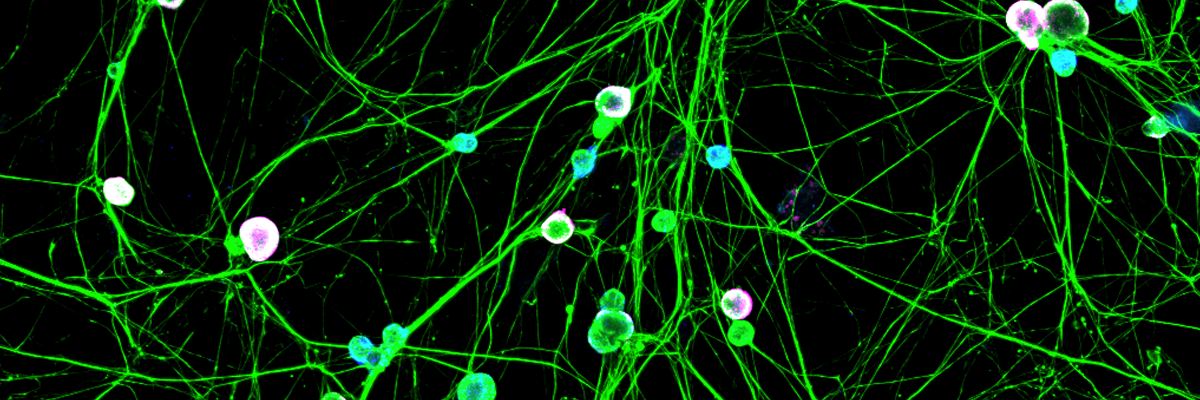Applied Cognition and Neuroscience MS
The ACN degree provides advanced training from diverse fields

The Master of Science in Applied Cognition and Neuroscience degree (ACN) provides students with advanced training that incorporates methodologies and approaches from such diverse fields as neuroscience, experimental psychology, artificial intelligence and human-computer interactions. In addition to preparing students for doctoral study in these areas, the scope and multidisciplinary nature of the degree make it relevant to students seeking careers in software development, engineering, education, psychology and medical professions.
Degree Program
Students earning a master’s degree in applied cognition and neuroscience specialize in one of five areas: neuroscience, cognition and neuroscience, human-computer interactions, computational modeling/intelligent systems or neurological diagnosis and monitoring.
The degree requires 36 graduate credit hours: six hours of core courses in the student’s area of specialization, six hours of research methods courses in the area of specialization, six hours of advanced elective courses in the area of specialization, 12 hours in one of the other specialization areas, and six credit hours of an industry internship, a research internship or supervised research in behavioral and brain sciences.
Many courses in the applied cognition and neuroscience program are offered periodically as evening courses to meet the needs of busy professionals’ schedules, and part-time students are welcome.
The UT Dallas graduate catalog provides more information on the Master of Science in Applied Cognition and Neuroscience degree program. The university’s course look-up site, CourseBook, describes specific courses in the ACN program.
Career Paths
The Master of Science degree in Applied Cognition and Neuroscience degree provides students with coursework and training that span the fields of neuroscience, experimental psychology, artificial intelligence and human-computer interactions. As such, a wide variety of career options are available to students on graduation, including doctoral study in these and related areas as well as professional careers in engineering, medical, educational and other settings.
Additional information about career opportunities in the specialization areas of the master’s degree is available on the websites listed below.
ACN Organizations
Cognitive-Neuroscience Specialization
American Psychological Association
Cognitive Science Society
Society for Mathematical Psychology
Society for Neuroscience
Cognitive Neuroscience Society
Computational Modeling/Intelligent Systems Specialization
Association for the Advancement of Artificial Intelligence
IEEE Computational Intelligence Society
Neural Information Processing Systems
Human-Computer Interaction Specialization
Usability Professionals Association
DFW Usability Professionals Association
Special Interest Group on Human Computer Interaction
Human Factors and Ergonomics Society
Neurological Diagnosis and Monitoring Specialization
American Society of Electroneurodiagnostic Technologists
American Society of Neurophysiological Monitoring
International Organization of Societies for Electrophysiological Technology
American Clinical Neurophysiology Society
Frequently Asked Questions About Neurological Diagnosis and Monitoring
Neuroscience Specialization
Society for Neuroscience
United States Association for the Study of Pain
International Society for Developmental Psychobiology
International Association for the Study of Pain
International Behavioral Neuroscience Society
International College of Neuropsychopharmacology
American Physiological Society
Admissions
Admission to the Applied Cognition and Neuroscience Master’s degree program is based on a review of the applicant’s grade point average (GPA), scores on the Graduate Record Exam (GRE), three letters of recommendation and a “statement of purpose” essay describing the applicant’s specific interests and career goals. See the UT Dallas graduate admissions page for details on the application process.
To be accepted for the fall semester, completed applications are due by May 1. To be accepted for the spring semester, completed applications are due by October 1 and to be accepted for the summer semester, completed applications are due by March 1.
Specific questions about applying to the applied cognition and neuroscience master’s degree program should be directed by email to Melanie Davis.
Master’s Academic Excellence Scholarships
It is expected that a small number of Applied Cognition and Neuroscience Academic Excellence Scholarships will be awarded in Fall 2025 and subsequent fall semesters. The scholarship consists of a one-time award of $1,000. In addition, out-of-state residents who receive this award in the Fall 2025 will be eligible for in-state tuition rates for that Fall semester and the subsequent Spring 2026 semesters. The application deadline for ACN Scholarships has closed.
Frequently Asked Questions (FAQ)
Does the Master’s Degree Program Provide Scholarships or Financial Aid?
There are limited resources for supporting incoming master’s students. Students can apply for need-based financial assistance, including loans, grants and work-study positions, through the University’s Office of Financial Aid. In addition, all nonresident students are automatically considered for a limited number of competitive scholarships that reduce the cost of nonresident tuition.
Can I Visit the Master’s Degree Program?
The program welcomes visitors before or after admission. We do not have a specified visitor’s day, but are always happy to answer your questions and visit with you about the program. Call or email the program office for admissions questions and general questions about the program.
What are the GPA and GRE Requirements for Admission?
Although there is no specific GPA or GRE cutoff for admission, a cumulative GPA of 3.0 is required. For students entering the program recently, the median GRE score was 307 and the median overall GPA was 3.4.
How Many Students do you Accept Each Semester?
We admit students for the fall, spring and summer terms. We typically enroll 50-60 new students in the fall term and 10-15 new students in the spring term.
What are the Requirements for Students Coming from Out-of-Field?
The master’s program in Applied Cognition and Neuroscience is a multidisciplinary program and is designed to accommodate students entering the program who have a diverse background and range of interests. Students with concerns or questions regarding preparation for entering the master’s program should contact the program office for more information.
What if I’m also Interested in Doctoral Study?
The master’s Program in Applied Cognition and Neuroscience provides excellent preparation for the pursuit of doctoral study in the fields of neuroscience, cognitive-neuroscience, and experimental psychology. However, the PhD program in Cognition and Neuroscience in the School of Behavioral and Brain Sciences at UT Dallas is independent of the master’s program in Applied Cognition and Neuroscience. Admission to the master’s program does not include admission to the PhD program. Students interested in applying to the PhD program should submit a separate application to the PhD Cognition and Neuroscience program office. If a student is admitted to the PhD program during or after the completion of their master’s degree in Applied Cognition and Neuroscience, some or all of the course credits completed in the master’s program may be applied towards the PhD program in Cognition and Neuroscience.
How Big Is the Master’s Degree Program?
The master’s program in Applied Cognition and Neuroscience is a growing program. As a 36-credit hour program, we have had over 140 students enrolled for fall and spring semesters in the past two years. While a majority of our students are full-time, we do have a small fraction of part-time students. With applied cognition and neuroscience being so broad our students select a specialization area on which to focus. Depending on what area you select, the core and method classes for that area can range from 30-40 students in these classes. Some of our more advanced elective courses consist of 10-15 students.
How Do I Make The Most Out Of My Experience In The Program?
“Overall, my experiences empower me to work not only work in the line of research I hope to make my career in, but also practice communication neuroscience research findings to the general public and raise awareness.” – Jasmine LaCoursiere, Class of Summer 2015
“The ACN program was very helpful in quickly introducing the basics of neuroscience with courses such as systems neuroscience, functional neuro-anatomy and intelligent systems and analysis and designs. Also with the help of courses such as memory and seminar courses in memory, I was able to learn in depth about cognitive neuroscience aspects of memory which is one of my primary areas of interest.” – Haripriya Srinivasaraghavan, Class of Spring 2015
Program Contacts
Program Head
Richard Golden, PhD
Office: GR 4.814
Phone: 972-883-2423
golden@utdallas.edu
Program Coordinator
Melanie Davis
Office: GR 4.824
Phone: 972-883-2588
melanie.davis@utdallas.edu
Program Mailing Address
Applied Cognition and Neuroscience Master’s Degree Program
ATTN Melanie Davis
School of Behavioral and Brain Sciences
The University of Texas at Dallas
800 W. Campbell Rd, GR41
Richardson, TX 75080
Phone: 972-883-2588
bbs.msacn@utdallas.edu
Program Resources
Applied Cognition and Neuroscience MS Fast Facts
This document provides a quick, printable overview of the program.
Introduction to the Applied Cognition and Neuroscience MS Program Video
This video presentation introduces students to the master’s program in applied cognition and neuroscience.
Introduction to the Applied Cognition and Neuroscience MS Program (PDF)
This PowerPoint presentation introduces students to the master’s program in applied cognition and neuroscience.






